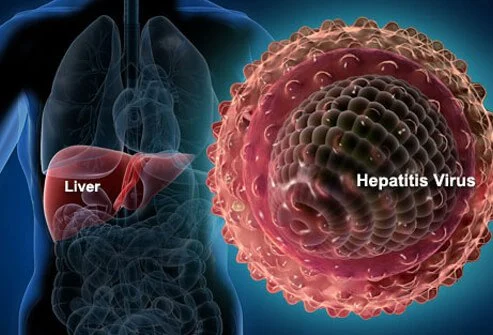
The World Health Organisation (WHO) has said that Nigeria has one of the highest burdens of viral hepatitis, with a national hepatitis B (HBV) prevalence rate of 8.1 per cent and hepatitis C (HCV) prevalence rate is 1.1 per cent among adults aged 15 to 64 years in the country.
The country representative, WHO, Dr. Walter Mulombo disclosed this to newsmen yesterday (July 25, 2022) in Abuja, as part of lineup of activities to commemorate the 2022 World Hepatitis Day themed “Hepatitis Can’t-Wait,” reflecting the urgency.
“There is a lack of awareness among the general populace as evidenced by a low uptake of available preventive services.
He lamented the high cost of treatment and out-of-pocket payment expenditures identified as impediments to treatment access for Nigerians to be aware of their status. However, Molumbo stated that in recent years there has been growing political commitment at the country level.
“By introducing the hepatitis B birth dose and the pentavalent (DTP-HepB-Hib) vaccine into routine childhood immunisation schedule since 2004, Nigeria is contributing to the global achievement of the reduction of hepatitis B infections in children across the country,” he said.
In his remarks, the Minister of Health, Dr. Osagie Ehanire lamented that despite significant rates of hepatitis B and C infection, there is very low awareness about the infection, under-reporting, under-diagnosed, under-treated, stigma and discrimination of those infected also pose challenges.
Ehanire said that consequently, nearly 20 million people were living with either hepatitis B or C in the country, which he said still poses public health challenges across the nation.
“The spread of Hepatitis B and C, similar to HIV, is fueled by unsafe sexual behaviour and injection practices, unsafe blood transfusion, harmful practices such as sharing of sharp objects for scarification marks, tattoos etc and mother-to-child transmission.
“We acknowledge the need to do much more than ever before to address this. The global theme for this year is “Bringing Hepatitis Care Closer to You,” he stated.
The minister opined that in line with the 2022 theme, the ministry with support from partners is taking concrete steps to ensure that hepatitis care is indeed brought closer to every Nigerian.
He explained that this important policy and strategic documents, as well as treatment protocols for viral hepatitis, have been developed in line with the Global Health Sector Strategy for viral hepatitis control.
“You may be aware that in May this year at the 75th World Health Assembly, WHO member states approved a new Global Health Sector Strategy for viral hepatitis.
“I am happy to inform you that Nigeria has in alignment with the new strategy, developed our own National Strategic Framework for Viral Hepatitis aimed at achieving the global target of eliminating viral hepatitis by 2030,” he added.
He pointed out that the core pillars identified for attaining the 2030 target include infant vaccination, prevention of mother-to-child intervention, blood and injection safety, harm reduction, diagnosis and treatment.
The National Strategic Framework will be formally presented as part of this briefing.
“As a country committed to the elimination of viral hepatitis by 2030, the need to create massive public awareness cannot be overemphasised. Together with this, we need to build the capacity of health care providers, expand access to diagnosis and treatment and improve community engagement as well as political leadership at all levels,” he explained.
Similarly, the country representative, United Nations Office on Drugs and Crime (UNODC), Ms. Uduak Daniel noted that to effectively raise awareness about hepatitis care to communities and individuals, there must be a focus on the vulnerable and the hard-to-reach populations such as people who inject drugs (PWIDs), as well as people in custodial centres and other closed settings were imperative.
Daniel said the use of prevalence of HCV is higher in prisons compared to the general population, although there was no known published national HCV prevalence studying prisons.
“An independent study conducted in 2020 among 142 people aged 18-50 years in a custodial centre in Nigeria showed an HCV prevalence of 29.6 per cent. The prevalence was twice as higher among men 31.0 per cent compared to women 15.4 per cent.
“UNODC continues to support Nigeria’s achievement of universal access to a comprehensive cascade of relevant health services for PWIDs and people in custodial centres,” she said.
Meanwhile, the president, Society for Gastroenterology and Hepatology in Nigeria, (SOGHIN), Prof. Abiodun Otegbayo also expressed concern over the non-availability of liver transplantation services in the country. He lamented that Nigerians still pay prohibitive costs to get cured outside the country.
Otegbayo called for urgent intervention from the Federal Government to curb the worrisome trend and halt the exodus of highly skilled health professionals, including gastroenterologists and endoscopy nurses, as well as trainees in the field of hepatology.
He observed with dismay the dwindling funding for the diagnosis, treatment and research on viral hepatitis in the country by all tiers of government.
World Hepatitis Day is invariably marked annually on July 28; Hence, the world shall commemorate the 2022 edition of the global programme.
It is noteworthy that the lofty event was inaugurated by WHO under the auspices of the United Nations (UN) to raise global awareness of hepatitis or a group of infectious diseases known as Hepatitis A, B, C, D and E, to encourage the prevention, diagnosis and treatment.

